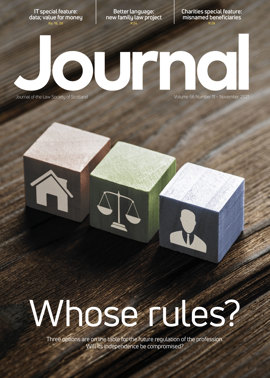Family: Domestic abuse and child orders: the full view?
The Domestic Abuse (Scotland) Act 2018 defines domestic abuse as abusive behaviour towards a partner or ex-partner. Behaviour directed at that person’s child is also considered to be domestic abuse.
Section 11(7A) and (7B) of the Children (Scotland) Act 1995 confirms that the court shall have regard to matters concerning domestic abuse in so far as they relate to the welfare of a child; however it provides little framework on how to ensure in practice that allegations are consistently investigated by the court. The subsections do not create a presumption against contact for the perpetrator of abuse: abuse is a factor in the wider welfare test.
Therefore, when a party makes allegations of domestic abuse in child-related proceedings there is often no formal process to find the truth of those allegations within those proceedings until proof. Separate criminal enquiries may be made and can then be relied on; however in many cases allegations of domestic abuse are unreported and therefore undocumented, or there may be a significant delay before a criminal trial takes place. In the absence of formal guidance, the court will consider domestic violence allegations and how they relate to orders sought by the parties, with some sheriffs perhaps taking a more conservative approach in light of outstanding criminal charges or historical abuse allegations than others.
In a recent sheriff court case, A v A [2021] SC GLW 018, the court relied on criminal proceedings before refusing interim contact in the family proceedings, considering that no child welfare report was required. After proof, the sheriff accepted evidence of both controlling and violent behaviour by the defender and ordered that no contact should take place as it was not in the child’s best interests. In contrast, in K v G [2021] SAC (Civ) 1, the sheriff’s decision was successfully appealed due to his failure to take account of the possible effects of abuse or the risk of abuse. The sheriff had considered the domestic abuse perpetrated by the father as historic and therefore irrelevant to the question of contact.
So how would the court consider allegations of domestic abuse in a more consistent manner before a proof and where it is asked to consider contact on an interim basis?
England & Wales approach
In England, domestic abuse allegations within children proceedings are dealt with rather differently, since the introduction of Practice Direction 12J, “Child Arrangements & Contact Orders” (“PD12J”), in October 2017. The practice direction includes definitions of domestic abuse (recently updated to include coercive and controlling behaviour as a result of the Domestic Abuse Act 2021), and also sets out how allegations of domestic abuse should be dealt with by the court prior to any involvement of Cafcass (Children & Family Court Advisory & Support Service).
One key component was for allegations of domestic violence to be set out in a schedule called a Scott schedule, to which the other party responded, after which a judge would consider whether a fact finding hearing was necessary to determine the truth.
However, in practice PD12J was not being followed, or was inconsistently followed, and it was found that the process relied heavily on specific events of domestic abuse in isolation of the nature of the parties’ relationship, meaning that abuse such as coercive control was rarely acknowledged to exist or simply minimised. These profound difficulties were considered in detail in four conjoined appeals all concerning domestic violence in relation to child proceedings and the application of PD12J, Re H-N and Others (domestic abuse: finding of fact hearing) [2021] EWCA Civ 448.
The Court of Appeal held that restricting parties to a schedule might not allow the court to see a full picture of repetitive abuse, and that another method of presenting allegations to the court might be necessary, such as concise narrative statements; or further investigations might be needed to establish the best way to detail domestic violence to the court where a more contextual approach should be adopted. In its conclusion the Court of Appeal confirmed the overall importance of “modern thinking” and “proper understanding of the nature of domestic violence” within the judiciary when considering child matters.
Commentary
This appeal has highlighted the importance of having a more contextual understanding of the nature of the relationship between the parties, and that will now be highly persuasive when looking at domestic abuse and its impact on future childcare arrangements. This is particularly important where allegations of coercive control are being made by one party. Perhaps borrowing the suggestions above may allow a different approach to be adopted within the context of children proceedings in Scotland.
Regulars
Perspectives
Features
Briefings
In practice
Online exclusive
In this issue
- Good legal software suppliers listen to you
- The trends that will shape law firms in 2022
- Technology won't solve everything...
- Key trends in legal tech adoption for UK law firms
- The top 4 benefits of moving to a cloud solution
- Why cyber risk management is not the same as IT support
- Business growth: finding the right package






